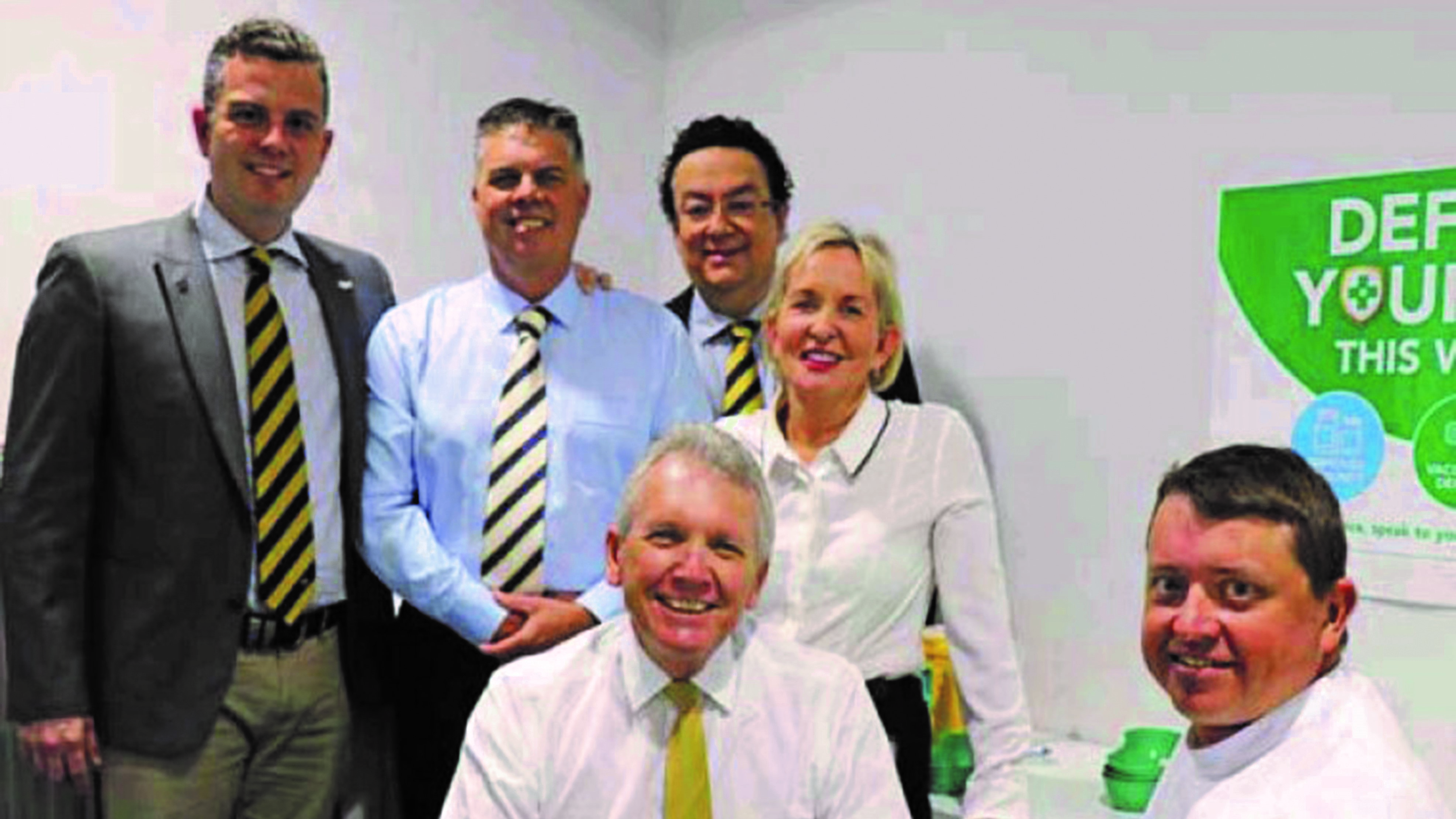The Queensland inquiry into pharmacy prescribing had at least half of its committee members exposed to very senior members of the pharmacy lobby before and during the process
The inquiry into extending the scope of pharmacists to prescribing by the Queensland government which reported last week appears to have had up to half of its committee members with undisclosed links to very senior members of the pharmacy lobby.
The chair of the committee, Aaron Harper, MP, is the member for Thuringowa, which sits as one of the electorates serviced by the North Queensland Primary Health Network, an organisation which is likely to have had several dealings with Mr Harper, and which until late last year was chaired by Trent Twomey, who is a major figure in the Pharmacy Guild of Australia, and was recently appointed vice president.
Mr Twomey and Mr Harper (top from left), along with another committee member Mike McCardle (centre front) are pictured here, at a pharmacy vaccination program launch in May this year. Present also (rear right) is long-time Guild power broker Mr Kos Sclavos. The picture, reproduced above, was taken at a Terry White Chemmart in Brisbane in May this year.
The Medical Republic does not infer any wrongdoing on the part of either Mr Twomey or Mr Harper in making this connection. However, some relationship between these parties appears to have existed well before the findings of the inquiry were reported last week, and there is no indication anywhere in the report of any such relationships.
In addition to the link to Mr Twomey, Mr Harper has spent much of his life as a paramedic, and his wife remains a senior figure in the paramedics association of northern Queensland. While no firm conclusion can be drawn about these facts and Mr Harper’s role in charge of the pharmacy prescribing inquiry, it is well known that the paramedics’ association has been closely aligned in the past with other allied health groups wanting to expand the scope of its professional medical remit into prescribing.
The paramedics’ association, along with the Pharmacy Board of Australia, was one of a few major allied health groups which made significant submissions to the now-defunct initiative of the Australian Healthcare Workforce Group in 2013, arguing that the profession should be allowed to prescribe. There is no mention of the potential conflict that Mr Harper’s previous work life, or that of his wife, might have on the inquiry report.
Another committee member, Ms Joan Pease, is the MP for Lytton. Her role since being elected in 2015 has brought her into contact on occasion with the Chair of the powerful Metro South Hospital and Health Service (MSHHS), Mr Terry White. Mr White, who retired as Chairman of MSHHS mid last last year, is the founder of one the country’s largest and most influential chains of chemists, Terry White Chemmart, a previous health minister in Queensland during the reign of Joh Bjelke-Petersen and a previous Queensland state Liberal party leader.
In his role as chair of MSHHS, Mr White effectively reported to the Queensland state government health minister.
Again, no wrongdoing is inferred in any of these relationships, however, it is apparent that up to half of the members of the inquiry had potentially meaningful dealings with senior members of the country’s pharmacy lobby in the lead up to the inquiry, none of which is declared in the inquiry report.
In addition to this, the submissions to the inquiry are very heavily weighted in favour of the pharmacy lobby.
For instance, there are 37 mentions of Terry White Chemmart in the 100-page report, 12 of the 210 submissions are from Terry White Chemmart chemists, larger than the next represented chain by a factor of four, and three of 29 hearing witnesses were pharmacists from Terry White Chemmarts.
Overall, 50% of the submissions were from pharmacists or bodies representing pharmacists, and 34% were from individuals. Of that 34%, most are pharmacy friendly, being pharmacists declaring themselves as individuals, or individuals connected in some manner with the pharmacy industry.
In total, nearly 90% of the 210 submissions were from the pharmacy sector or from organisations which favour increasing the scope of pharmacists’ roles in the community into prescribing.
The Medical Republic put all these potential issues to the Queensland Department of Health for comment, but had had no response by the time of publishing.


